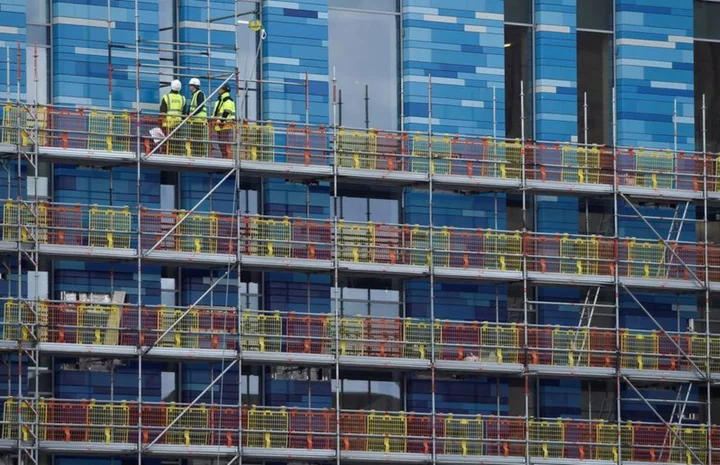By David Milliken and Andy Bruce
LONDON (Reuters) -British house building fell in June at the sharpest pace in more than 14 years, apart from two months early in the COVID-19 pandemic, as higher borrowing costs dampened demand and weighed on the broader construction sector, a survey showed on Thursday.
The S&P Global/CIPS construction Purchasing Managers' Index (PMI) dropped to a five-month low of 48.9 in June from 51.6 in May, below economists' forecast of 51.0 in a Reuters poll and the 50 level that divides growth from contraction.
The decline was driven by a far steeper slump in the house building component, which slid to 39.6 from 42.7, its lowest since May 2020 and before 2020 the lowest since April 2009, when the global financial crisis hammered mortgage lending.
"Survey respondents widely commented on cutbacks to new residential building projects and more caution among clients in response to rising interest rates," Tim Moore, economics director at S&P Global Market Intelligence, said.
Last month the Bank of England (BoE) unexpectedly raised interest rates to 5% from 4.5%, and typical interest rates for two-year fixed-rate residential mortgages - the commonest form of finance for buyers - have risen above 6.5%, according to data provider Moneyfacts.
"It is therefore no surprise that house builders are slowing down their pipeline of work and acting cautiously to protect their margins," said Kelly Boorman, national head of construction at accounting firm RSM UK.
Big increases in swap rates - which underpin mortgage funding costs - often precede large falls in housing starts, according to a Reuters analysis of the last 35 years.
Official data has already shown falls in house building.
April figures showed total construction volumes were 3.6% higher than a year earlier, but new housing was down 6.1%, the biggest annual decline since January 2021.
The PMI survey showed civil engineering and commercial construction continued to grow reasonably in June, bolstered by large infrastructure projects and refurbishment work.
However, concern about the broader economic outlook did lead to a small drop in new orders and greater caution among clients.
Input costs fell for the first time since January 2010, due to lower prices for fuel, steel and timber - which may ease some of the BoE's inflation worries - while business confidence dropped to its lowest since January.
S&P's all-sector PMI, which includes services and manufacturing PMI data released earlier in the week, dropped to a three-month low of 52.5 in June from May's 53.8.
(Reporting by David Milliken, graphic and additional reporting by Andy Bruce; editing by Toby Chopra and Alexander Smith)

